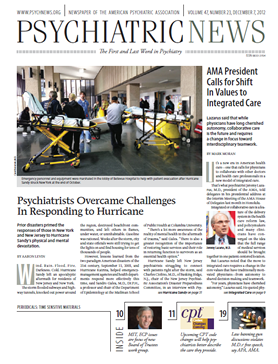Noven Begins Phase 2 Study Transdermal System for ADHD
Noven Pharmaceuticals, a subsidiary of Japan-based Hisamitsu Pharmaceutical Company, has announced that it had commenced a phase 2 study of a
d-Amphetamine Transdermal System (d-ATS) for the treatment of attention-deficit/hyperactivity disorder (ADHD) in children and adolescents. Currently, there is no approved amphetamine-based transdermal treatment option available for ADHD. The phase 2 study is a randomized, double-blind, placebo-controlled, crossover study to evaluate the safety and efficacy of d-ATS compared with placebo in subjects between ages 6 and 17 years. The study is expected to enroll approximately 90 subjects at up to five study sites and is scheduled to conclude in the second quarter of 2013. Additional information on the phase 2 study will be made available on
ClinicalTrials.gov.
Amyvid Recommended for Approval in EU
On October 19, Eli Lilly and Co. and Avid Radiopharmaceuticals (a Lilly subsidiary) announced they received a positive opinion from the Committee for Medicinal Products for Human Use (CHMP) in Europe, recommending approval of Amyvid (Florbetapir F18) solution for injection as a diagnostic radiopharmaceutical indicated for positron emission tomography (PET) imaging of beta-amyloid neuritic plaque density in the brains of adult patients with cognitive impairment who are being evaluated for Alzheimer’s disease and other causes of cognitive impairment. The positive opinion is now referred for final action to the European Commission, which has the authority to approve medicines for the European Union (EU). The commission usually decides on CHMP recommendations within three months.
Amyvid for intravenous use was approved by the U.S. Food and Drug Administration (FDA) in April and is supplied in 10 mL, 30 mL, or 50 mL multidose vials containing 500–1900 MBq/mL Florbetapir F18 (Psychiatric News, June 1). In a press release announcing the recommendation, Lilly and Avid said that Amyvid is an adjunct to other diagnostic evaluations. A positive Amyvid scan does not establish a diagnosis of Alzheimer’s or other cognitive disorder. Additionally, the safety and effectiveness of Amyvid have not been established for predicting development of dementia or other neurologic condition or monitoring responses to therapies.
Alzheimer’s Drug Results ‘Encouraging’
An independent research consortium has announced that new information about the potential Alzheimer’s drug solanezumab, being developed by Eli Lilly, is “encouraging.” The Alzheimer’s Disease Cooperative Study (ADCS) presented results from its analyses of the EXPEDITION study data at the annual meeting of the American Neurological Association. Lilly provided the data collected from the EXPEDITION studies to the ADCS.
On August 24, Lilly announced that its clinical trials in more than 2,000 people showed the drug was unable to halt the disease’s progress on measures of cognition and functionality. Lilly’s announcement followed by less than a month the failure of a similar drug, bapineuzumab, being developed by Pfizer and Johnson and Johnson. But Lilly did note evidence of “statistically significant slowing of cognitive decline in subjects with mild to moderate Alzheimer’s who were taking the drug.”
Rachelle Doody, M.D., Ph.D., a professor of neurology at Baylor College of Medicine and a member of the ADCS steering committee, said, “Alzheimer’s disease research has been extremely challenging. The data results from the solanezumab phase-3 trials… represent an important step for the medical, academic, and scientific communities in understanding brain amyloid as a target of Alzheimer’s disease therapies.”
CHMP Declines Approval of Qsiva
On October 18, Vivus announced it had received a formal opinion from the European Medicines Agency’s (EMA) Committee for Medicinal Products for Human Use (CHMP). As expected, the CHMP recommended against approval of the Marketing Authorization Application for Qsiva (phentermine/topiramate ER) for the treatment of obesity in the European Union. The reasons for its decision were due to concerns over the potential cardiovascular and central nervous system effects associated with long-term use, teratogenic potential, and the possibility of use by patients for whom Qsiva is not indicated. The company intends to appeal this opinion and request a reexamination of the decision by the CHMP.
The drug combination, known as Qsymia in the United States, was approved by the FDA in July as an adjunct to a reduced-calorie diet and increased physical activity for chronic weight management in adults with an initial body mass index of 30 kg/m2 or greater (obese) or 27 kg/m2 or greater (overweight) in the presence of at least one weight-related medical condition such as high blood pressure, type 2 diabetes, or high cholesterol. More information about Qsymia’s approval in the United States was published in the September 7 and November 2 issues of Psychiatric News.
Reckit Benckiser Discontinues Suboxone Tablets
Reckitt Benckiser Pharmaceuticals said it notified the FDA in September that the company is voluntarily discontinuing the supply of Suboxone tablets (buprenorphine and naloxone sublingual tablets [CIII]) in the United States due to increasing concerns over pediatric exposure. The company received an analysis of data from U.S. Poison Control Centers that found consistently and significantly higher rates of accidental unsupervised pediatric exposure with Suboxone tablets than seen with Suboxone film (buprenorphine and naloxone sublingual film [CIII]). The rates for Suboxone tablets were 7.8 to 8.5 times greater depending on the study period.
“While the data do not isolate the root cause of these findings, the unique child-resistant, unit-dose packaging of the next generation Suboxone film is believed to be one of the key contributing factors to the decrease in exposure rates compared to Suboxone tablets that are distributed in a multidose bottle containing 30 tablets, since the active ingredients of both products are the same,” said the company.
The company said that it is working closely with the FDA and the health care community to ensure patients taking Suboxone tablets have sufficient time and notification to transition to the same effective active ingredient with Suboxone film to minimize any risk to the continuity of their treatment.

